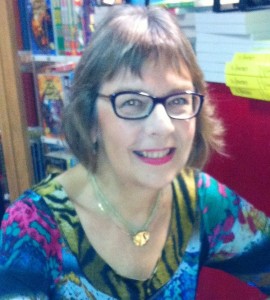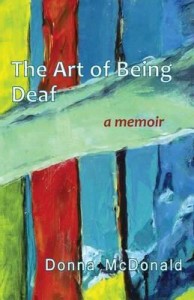Following Honey Brown’s poignant account of how disability can sting and stir one’s psyche, is our second guest writer for our focus on Australian Women Writers with Disability: Donna McDonald. Donna, whose mother noticed she was deaf when she was small, was enrolled in a school for deaf children, but when she was eight she was removed from this school and sent to a mainstream school. Only as an adult did Donna consider what impact her removal from her deaf peers might have had upon her, a journey which is detailed in her memoir The Art of Being Deaf.
 Donna’s post shows how wearying it can be to fight for empathy, for the right to live and love in a world that is shaped for able-bodied people without, as she writes, ‘having to perform staggering, contortionist-like feats of “normalcy”’. At the same time, her act of writing is testimony to that fight. It’s a reminder that through books we can contemplate modes of being other than our own, and be compelled to support them.
Donna’s post shows how wearying it can be to fight for empathy, for the right to live and love in a world that is shaped for able-bodied people without, as she writes, ‘having to perform staggering, contortionist-like feats of “normalcy”’. At the same time, her act of writing is testimony to that fight. It’s a reminder that through books we can contemplate modes of being other than our own, and be compelled to support them.
We have a book giveaway for The Art of Being Deaf, as well as three others from the guest writers this month: Honey Brown’s latest novel, Through the Cracks, Kate Richards’ Madness: A Memoir and my own novel, Entitlement. If you read and review a book by an Australian women writer with disability, or a book by an Australian women writer that features a character with disability, you’ll be in the running for a book! Links must be posted by 30th September through this form. You can also find authors on our list of Australian Women Writers with Disability.
Memoir as Protest
My memoir, The Art of Being Deaf, was published by Gallaudet University Press in March 2014. In the wake of its publication, I have been interviewed by radio identities and other writers; questioned by friends and students; and bailed up in the workplace by my colleagues. Two questions have become the dominant leitmotif of all those conversations: why did I write it, and how do I feel about having put myself “out there”?
My answer to the latter question is constant: I don’t feel much at all. At least, not in the way that the questioners appear to suspect that I ought to feel. My questioners give me the impression that I ought to feel exposed, as if I have stripped myself naked under the scorching arc-lights of a theatre stage. This is a misreading of the memoirist’s primary task and her multiple roles in undertaking that task. A memoirist is required to give an account—grounded in gentle reflection and tough self-scrutiny, occasionally leavened by humour—of certain themes that perhaps trouble the memoirist, or nag at her as requiring an explanation. A memoir is a personal reckoning with the self, and with the readers who the memoirist is seeking to influence, sway, inform or alter in some way. In undertaking this self-searching quest, I found myself devolved into three distinct roles: as the subject of the search—myself as the person being investigated and quarried for insights and discoveries; the narrator who “tells” the reader about the ups and downs of that usually circumlocutory investigation; and the writer who shapes the tale into a crisp, readable, entertaining story.
By devolving  myself into these disparate but purposeful roles, the “I” of my memoir evolved into a character who looked and sounded like me, who reportedly had the same experiences as me, and who—just like me—wrestled with questions about the implications of being deaf on the quality of her life. However, that character is not “me”. The written text is just a representation of “me” at a single point of time, the time of writing. For this reason, I do not feel vulnerable for having disclosed so much about myself. Time marches on; the “I” in The Art of Being Deaf is a person from the past. I have since moved onto fresh questions.
myself into these disparate but purposeful roles, the “I” of my memoir evolved into a character who looked and sounded like me, who reportedly had the same experiences as me, and who—just like me—wrestled with questions about the implications of being deaf on the quality of her life. However, that character is not “me”. The written text is just a representation of “me” at a single point of time, the time of writing. For this reason, I do not feel vulnerable for having disclosed so much about myself. Time marches on; the “I” in The Art of Being Deaf is a person from the past. I have since moved onto fresh questions.
In contrast to this constant response, I flail about when I try to nail down a precise answer to the question, “Why write a memoir?” My equivocation is the result of the passage of time. My reasons for embarking on the memoir all those years ago—it originated as a short essay back in 2002—are very different from the reasons I offered in the final chapter of my memoir and they, in turn, are different again from the reasons I offer now with the perspicacity of hindsight.
I was prompted into writing that short essay following a visit to a psychologist who asked me (somewhat redundantly, I thought at the time) whether my deafness had had a “big impact” on my life. I mocked his question at first and responded by writing an article which showed off my writing skills but which left me exposed to an editor’s criticism that I had been glib and inauthentic. I was stung into deeper reflection, which led me into ever deepening territories of confusion, distress and anxiety shaped by the driving question: who was I? To what extent did my deafness and my being deaf shape not only my life experiences, but my sense of self?
These personal questions were the catalysing motivations for writing my memoir. However, such a narrow focus on self is not sustainable over the long haul of writing. I grew bored with myself; tired of the navel-gazing. I cast around for a broader scope, and found it by reading about the experiences of other deaf people—either as fiction or as memoirs and biographies. This wider reading acted as a lightning rod for my latent discontent. By reading those accounts, I witnessed the hurts, cruel slights, inequities, false heartiness, and strenuous efforts to fit in, and saw myself reflected in those many stories. I came to understand that my account of deafness and being deaf was no longer a singular story. It is more than that. My memoir is both a personal reckoning and a protest that stands alongside many other such accounts, contributing to a bigger picture of the struggle by generations of deaf and hard-of-hearing people around the world to secure a good education, a proper job, and the affection, respect and love of hearing friends, colleagues and family without having to perform staggering, contortionist-like feats of “normalcy”.
In writing the final chapter of my memoir, I claimed I had reconciled my childhood deaf self and my adult hearing-deaf persona. I conveyed a quiet joy about this. I still stand by that claim. It was true at the time of writing, and it remains true today.
However, since the publication of my memoir—and the subsequent re-excavation of my memoirist recollections by those interviewers, writers, friends, colleagues and students—new emotions have revealed themselves to me, settling alongside that spirit of reconciliation. Anger. Frustration. Grief. The surge of these emotions caught me off-guard, and I was puzzled by them at first. I have come to understand that they arise from the chastening realisation that my memoir, in which I set down so many of my “being deaf” experiences, is unlikely to change the quality of life of most deaf people. Individual readers may enjoy my memoir and be moved by it, but the world at large remains obtuse. The struggles of most deaf and hard-of hearing people continue. Right now, as I write these words, I am sad and exhausted. I am exhausted by my life-long commitment to being a warrior of sorts—a warrior for the rights of deaf people to be the very best version of themselves, by having access to love, education, and work. I am sad because I see no end yet to this very necessary fight for rights. I hope my anger acts as a fuel to keep my commitment burning.






Reblogged this on Reading, Writing and Riesling and commented:
A great insight to memoir and… life…
Wonderful – I’m really glad it inspired you to re-post 🙂
A great post Jessica